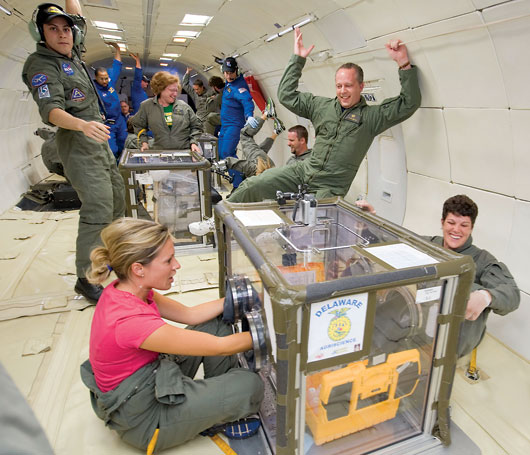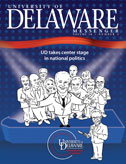For these teachers, the sky's no limit

ALUMNI | Kellie Michaud, AG ’01, ’04M, used to dread going up in a plane. But now, after a flight in NASA’s Reduced Gravity Program this summer, Michaud claims to be a “zero G” junkie.
Michaud and three other Delaware agriscience teachers—also UD alumni—were selected by NASA and the National Science Teachers Association for the pilot, 10-day program for teachers. They were tasked with designing an experiment and then conducting it on a Boeing 757 that simulated near-zero-gravity environments and the reduced gravity of Mars and the moon.
Sarah Bell, AG ’07, Cathy DiBenedetto, AG ’92, EH ’09M, and Scott Haldeman, AG ’05, ’06M, and Michaud proposed the project “Capturing Carbon From Fossil Fuels and Biofuels: Does Gravity Matter?” and dubbed their group “Team Ag.”
“Biofuels and green energy are such hot topics in agriculture,” Michaud says. “We can use those topics in plant science, environmental science and even ag mechanics classes to really get the students thinking.”
The team’s project meant that while their plane was maneuvering more than a dozen times into climbs and dips at 45 degrees, all while changing altitude nearly 10,000 feet, they would be burning samples of kerosene (a fossil fuel) and ethanol (a biofuel) and capturing carbon samples from each.
Before their summer flights, the teachers conducted a version of the experiment with their students in class. They then replicated the experiment under the zero-, 1- and 2-G conditions aboard the plane.
The teachers were under tight scrutiny by NASA officials because they were working with fire and flammable liquids. They say the pressure of presenting the projects for approval by 20-30 NASA officials the Monday before the flight was probably more nerve-racking than the flight itself.
The team was split into two pairs, one pair flying the day before the other. “Because we weren’t used to the different forces of gravity, we ran into some problems on our first flight, just getting the fuel sources lit,” Michaud says.
Bell says that on the day he flew, “We burned a total of 15, 150-milliliter samples, taking emissions on every single parabola [the dips and arcs that the plane makes], getting the maximum number of data points possible. It really gave us something to show for our experience.”
The teachers likened the experience to being on a roller coaster without the wind or the rattling. “You’re just gliding along, and then all of a sudden you’re floating. Then there’s a period of transition, and then you’re smacked with the feeling of being twice your weight,” Haldeman says. “The first thing that my students ask me is if I got sick. Then they want to know about the experiment and if their hypothesis was right.”
All of the Team Ag teachers are graduates of the National Agriscience Teacher Ambassador Academy, a professional development program sponsored annually by DuPont. Michaud says that without the encouragement and help of their DuPont liaison for the program, P.J. Simon, their NASA experience would not have been possible.
“P.J. isn’t the kind of person who you say no to,” Michaud says. “She sent us the notice of the application 48 hours before the deadline, and because they wanted a biology-based project, we really had to pull together something that would fit.”
The teachers’ 10-day trip to Houston, Texas, was sponsored by DuPont’s Pioneer Hi-Bred business, the DuPont Office of Education, in collaboration with the Delaware Department of Education, and the Delaware Association of Agriscience Educators.
“The program was intense. We were working the whole time, spending our time learning by doing,” Bell says. “And that’s exactly how we are encouraged to teach our students.”
Article by Katy O’Connell, AG ’00





